the evolution of my views on the Trinity – part 4
Just starting to think about the Trinity, as a Masters student.
Just starting to think about the Trinity, as a Masters student.
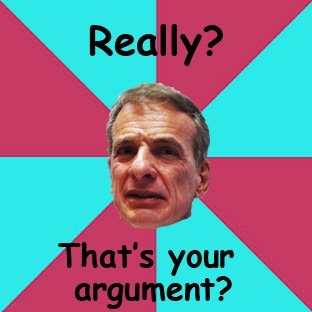 This post is a commentary on the Craig-Rosenberg debate. Most of my comments are in italics; factual reporting is in regular text.
This post is a commentary on the Craig-Rosenberg debate. Most of my comments are in italics; factual reporting is in regular text.
In short, Craig undeniably wins. I felt bad for Rosenberg, and could hear naturalistic philosophers of religion face-palming throughout the debate.
Debaters: there’s a lot you can learn from here.
An interview about my background, Philosophy, the evolution of my views.
Can a unitarian Christian explain why God has the capacity for interpersonal love?
“And if our hope in Christ is only for this life, we are more to be pitied than anyone in the world. But in fact, Christ has been raised from the dead. He is the first of a great harvest of all who have died. So you see, just as death came into the world through a man, now the resurrection from the dead has… Read More »He is risen! (Dale)
Want to debate (or just refute) me? Here are some things you should study.
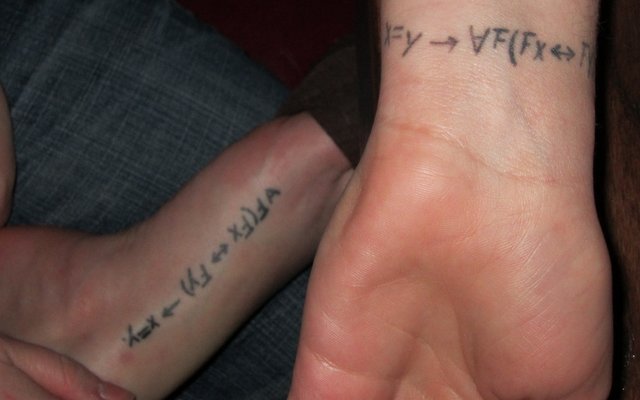
I love philosophy majors. The best of them almost always develop a nerdy and warped sense of humor – and I mean that in the best way. 🙂
These two young ladies, recent alumnas of our department, decided to get complementary tattoos. (Sober, they swear!)
In each case, the tattoo artist left off the two initial universal quantifiers: AxAy (I can’t find the symbol codes for the upside down A representing the universal quantifier – so please imagine those A’s upside down.) They would read: For any x whatsoever and for any y whatsoever…
Now to the tattoos. “F” is supposed to be, either a predicate or a property. On the right tattoo (wrist) the right, closing parentheses is just out of view.
One of the tattoos says something nearly all philosophers agree is true (a rarity!) while the other is held to be false by many. Here’s your homework, dear reader:Read More »A Tale of Two Tattoos (Dale)
Congratulations to trinities contributor J.T. Paasch on his “Arius and Athanasius on the Production of God’s Son”, which has come out in the most recent issue of the prestigious philosophy of religion & philosophical theology journal, Faith & Philosophy (Vol. 27, No. 4, October 2010, pp. 382-404) Hey JT – do you have a preprint posted online anywhere? Here is JT’s abstract, to whet your… Read More »Congratulations to J.T. Paasch (Dale)
Call me a satisfied customer – I had a great time at the Eastern Regional Conference of the Society of Christian Philosophers this weekend. Thanks to Patrick Toner and Wake Forest University for their great hospitality! The program was very strong. To mention just a few sessions: Paul Herrick present a paper analysing and endorsing Richard of St. Victor’s main argument for the Trinity, and… Read More »Eastern SCP report (Dale)
The Trinity Challenge, from a Sufi Muslim blog. The comments there are wild and wooly. There’s a charge of polytheism, and some non-trinitarian Christians weigh in. The challenge, of course, cannot be met. But it seems to me he’s carelessly overlooking the options that the Trinity doctrine is: (1) implicitly taught in the Bible (i.e. it is deducible from what is there, though not explicitly… Read More »Linkage: a Muslim challenge (Dale)
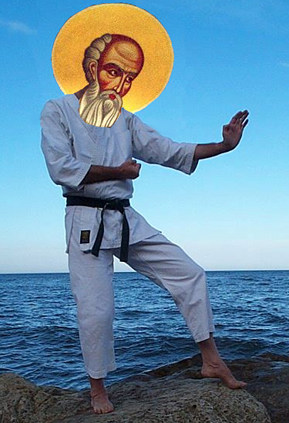 Philosopher Graham Priest is notorious for his claim that there are true contradictions. I have to confess that when I first heard this years ago, I thought the people telling me were pulling my leg. But, they were not. Priest is deadly serious, and has developed paraconsistent logics – logical systems which allow some true contradictions. And he’s vigorously defended his claims against all comers, as in this recent book.
Philosopher Graham Priest is notorious for his claim that there are true contradictions. I have to confess that when I first heard this years ago, I thought the people telling me were pulling my leg. But, they were not. Priest is deadly serious, and has developed paraconsistent logics – logical systems which allow some true contradictions. And he’s vigorously defended his claims against all comers, as in this recent book.
No, he doesn’t say that all contradictions are true – only some of them. And the ones which are true are also false. He claims that this thesis of dialetheism solves the liar paradox and others.
Very rarely, some theologian will come along, and assert that the Trinity doctrine is a true contradiction – not a merely apparent contradiction, but a real one.
Most Christians, though, eschew such a claim. Mysterian James Anderson discusses and rejects this approach to Christian mysteries in his book Paradox in Christian Theology.
Much to my surprise, I recently found a move like Priest’s in Gregory of Nazianzus (d. c. 390), in his Third Theological Oration.
Gregory is considering an argument by Arians, a premise of which is that the Son who the Father begot either was or was not in existence – I take it, prior or “prior” to his being begotten. (It is clear at the end of this section that Gregory takes them to mean literally before.)
Gregory asserts that this claim “contains an absurdity, and not a difficulty to answer.” He then gives a non-too-clear time example, which I’ll skip. Then he argues,
…in regard to this expression, “I am now telling a lie,” admit one of these alternatives, either that it is true, or that it is a falsehood, without qualification (for we cannot admit that it is both). But this cannot be. For necessarily he either is lying, and so is telling the truth, or else he is telling the truth, and so is lying. What wonder is it then that, as in this case [of the liar paradox] contraries are true, so in that case [concerning the Arians’ premise above] they [i.e. both alternatives] should both be untrue, and so your clever puzzle prove mere foolishness?
I take it that the “contraries” he mentions would be: “the man is lying” and “the man is telling the truth”. Contraries are often defined nowadays – I’m not sure how they were defined in his day – as claims that can’t both be true. But here, Gregory asserts that both are trueRead More »Gregory of Nazianzus – an early dialetheist? (Dale)
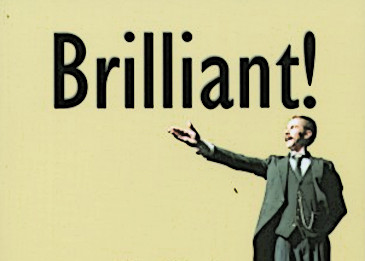
Kudos to the team at the Internet Encyclopedia of Philosophy, for
Missing in #2 are references to, if not summaries of, Tom Senor’s work, particularly his criticisms of the Stump/Leftow property-borrowing approach, and of the hoary qua-move. Maybe a couple of references to Hick would be appropriate as well, e.g. his criticism of two-minds theories. Positively, maybe a reference to van Inwagen on relative identity. But on the whole, I thought it was well done – congrats to David. And I hope we see more philosophical theology in the IEP.
One quick reflection:Read More »“Incarnation” @ the Internet Encyclopedia of Philosophy (Dale)
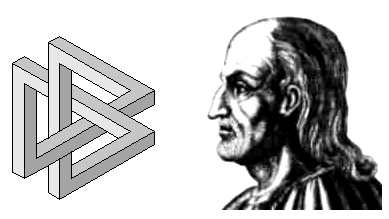
“This clears it all up, right?”
Anselm: “Um, no. I must bestow upon it the analytic frown of uncomprehension.”
(image credit)
I used to think I had a great objection to Anselm’s famous ontological argument. (Bear with me – this has something to do with social trinitarianism.) The argument, at least many forms of it, basically goes like this. If it is logically possible that there’s a Greatest Possible Being (i.e. a being such that there’s no logical possibility of there being a greater one), then it is necessary that there’s a Greatest Possible Being. More simply: if it’s possible (non-contradictory) that God exists, then it’s also necessary that God exists (i.e. it is inconsistent to suppose God not existing). (For more, see here and here. For more than you’d ever want to know, here.)
Many critics have replied like this:
I’d be a sucker to grant your premise. Why should I think that the notion of a Greatest Possible Being is the notion of a possible thing at all? Read More »perfection, the Trinity, and impossible beings (Dale)
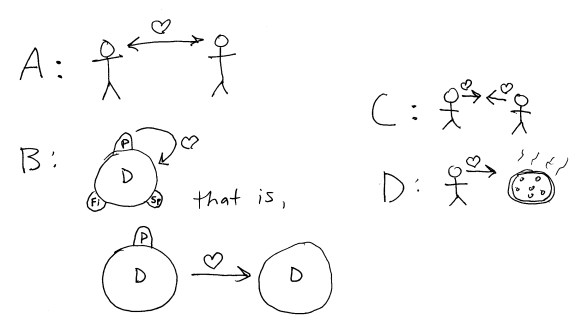
Four vivid, moving, memorable depictions of Love.
A post on some previous post commentary – no one can navel-gaze like a philosopher! 🙂 Here’s a pictorial recap, and some additional thoughts on the comments here, in response to Scott and JT. The point of all this: we’re exploring why people who call themselves “social trinitarians” don’t like what they call “Latin” theories, and specifically the claim that those “Latin” theories can’t do justice to the loving relationships between the persons of the Trinity.Read More »on interpersonal love and stick figures (Dale)
You tell ’em, Joe. An interesting post & discussion: Alexander Pruss’s Blog: Liberal theology I think a lot of liberal theologians don’t have a “high view of reason” – many (not all) of them strike me as lazy drifters on miscellaneous intellectual currents. e.g. Has anyone’s reason really revealed to them, so to speak, that miracles don’t happen, or even that it’s irrational to believe… Read More »Linkage: Pruss on liberal theology (Dale)
Do I ignore “the” being/Person distinction?
A new debate: opening statements and rebuttals.
Why we don’t accept this sort of interpretation.